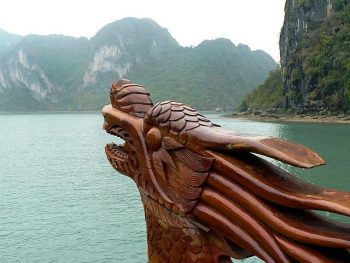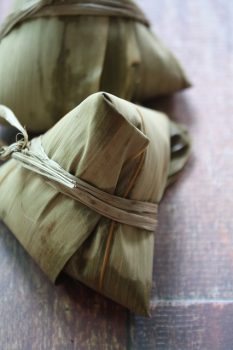About the Dragon Boat Festival Customs Posted by Ayana on Jun 3, 2019 in Culture
The Dragon Boat Festival is known in Chinese as 端午节 (Duān wǔ jié). It is celebrated every year on the 5th day of the 5th lunar month, which falls on June 7 in 2019.
- 端午节,这个重大节日举国同庆。
Duān wǔ jié, zhè ge zhòng dà jié rì jǔ guó tóng qìng.
The whole nation celebrates this significant holiday of the Dragon Boat Festival.
Many customs (习俗xí sú) are observed during this holiday. Dragon boat racing (赛龙舟sài lóng zhōu) is the main custom associated with the festival. As legend has it, the patriotic poet and statesman Qu Yuan, who lived during the Warring States period of ancient China, was devastated by the invasion of an enemy army to his motherland. On the 5th day of the 5th lunar month, he threw himself into the Miluo river (投江tóu jiāng).
- 赛龙舟是中国端午节的习俗之一。
Sài lóng zhōu shì zhōng guó duān wǔ jié de xí sú zhī yī.
Dagon boat racing is one of China’s Dragon Boat Festival customs.
Many people rushed into the river. They rowed (划船huá chuán) their boats, trying to save (拯救zhěng jiù) him or at least salvage (打捞dǎ lāo) his body. They paddled out to the river and drummed on their boats to scare off the fish and the evil spirits. Nowadays, the annual main event of 五月初五 (wǔ yuè chū wǔ, the 5th day of the 5th lunar month) is boat racing (舟竞渡zhōu jìng dù) in commemoration of Qu Yuan. All around China, crowds gather around lakes to cheer on the teams, and to enjoy the festive atmosphere.
- 龙舟竞渡习俗是为了纪念屈原。
Lóng zhōu jìng dù xí sú shì wèi le jì niàn qū yuán.
The custom of dragon boat racing is to commemorate Qu Yuan.
Another custom to commemorate (纪念jì niàn) Qu Yuan is food related custom (食俗shí sú). After failing to save Qu Yuan or find his body (尸体shī tǐ), the fishermen of Miluo river dropped food into the water. They were afraid his body was trapped by 蛟龙 (jiāo lóng, a dragon in Chinese mythology), and wanted to make sure the dragon and the fish are well fed so they wouldn’t eat Qu Yuan’s remains.
- 在端午节,最受欢迎的食物就是粽子。
Zài duān wǔ jié, zuì shòu huān yíng de shí wù jiù shì zòngzi.
The most popular food at the Dragon Boat Festival is Zongzi.
The fishermen also wanted to make sure that Qu Yuan himself would be well fed in the afterlife. They wrapped the food with leaves and tied it with a silk thread so it won’t be eaten by the dragon or the fish. This legend shaped the traditional food of the Dragon Boat Festival – the 粽子 (zòng zi). The Zongzi is glutinous rice stuffed with different fillings and wrapped in bamboo leaves. There are variety of fillings: with meat, or vegetarian, some are sweeter and some are less. During the Dragon Boat Festival public activities of making Zongzi (包粽子bāo zòng zi) are common. Volunteer groups gather to make Zongzi for elderly (like these high school students from Taiwan); Zongzi making competitions are arranged on street corners (this competition, for example).
- 为了迎接端午节的到来,中国多地举办了包粽子比赛。
Wèi le yíng jiē duān wǔ jié de dào lái, zhōng guó duō de jǔ bàn le bāo zòng zi bǐ sài.
Many places in China welcome the arrival of the Dragon Boat Festival with Zongzi
competitions.
Watch this short video of CCTV4 channel about the above two customs of Dragon Boat Festival and other customs:
https://www.youtube.com/watch?v=J0a-yRfs5j4
Text vocabulary
端午节 Duān wǔ jié = Dragon Boat Festival
节日 jié rì = festival
习俗 xí sú = custom
赛龙舟 sài lóng zhōu = dragon boat racing
投江 tóu jiāng = throw oneself to the river
划船 huá chuán = rowing, to row
拯救 zhěng jiù = to save, to rescue
打捞 dǎ lāo = to salvage
五月初五 wǔ yuè chū wǔ = the 5th day of the 5th lunar month, another name for the Dragon Boat Festival
舟竞渡 zhōu jìng dù = boat racing
纪念 jì niàn = to commemorate
食俗 shí sú = an eating custom, food related custom
尸体 shī tǐ = corpse
蛟龙 jiāo lóng = a dragon in Chinese mythology
食物 shí wù = food
粽子 zòng zi = glutinous rice and choice of filling wrapped in leaves and boiled
包粽子 bāo zòng zi = to make (wrap) Zongzi
迎接 yíng jiē = to welcome
好好学习,天天向上!

Build vocabulary, practice pronunciation, and more with Transparent Language Online. Available anytime, anywhere, on any device.






Leave a comment: